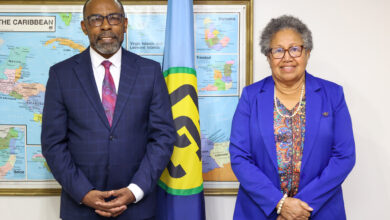The structure and scope of the work of the newly-installed CARICOM Commission on Youth Development in relation to its mandate came under focus at the Commission’s first Plenary Session, at the Hotel Krasnapolsky in Suriname, on Tuesday March 6.
Setting the tone for the Meeting, CARICOM Assistant General Secretary, Human and Social Development, Dr Edward Greene emphasised the need for a lucid interpretation of the Commission’s mandate, and pointed out that some of the key issues on the agenda were related to mitigation of risk factors for youth, participation in the CSME, and governance.
“The discussion of these,” he said, “is intended to bring greater clarity to the activities and help commissioners to identify priorities and make recommendations based on empirical information rather than on idiosyncrasies.”
Professor Barry Chevannes, Co-Chair of the Commission, who participated virtually in the session, pointed to the role that institutions such as school, family and mass media must play in creating an enabling environment for youth by reducing risk factors and helping them to overcome vulnerabilities, and cited this as one of the critical research areas for the Commission.
According to Professor Chevannes, the issue of absentee fathers must be addressed. He noted that several studies had pointed to the notion that the more adjusted child is the one who benefits from the support of both parents. He further argued that economic constraints have somewhat challenged many Caribbean fathers in playing a critical role in the lives of their children and stressed the need to help the family as the first line of defence in the socializing chain.
Expressing concern that the purview of the Commission might be a little narrow, Professor Chevannes said that the Commission should not be contextualised as an element or component of the CSME, but should be viewed as a Commission which would provide the framework that could help prepare the ideal Caribbean Youth.
He suggested that among the areas for research the Commission must explore the role of violence in defining young people. “I think that we have underestimated the role of violence as a sub-culture which gives young people a sense of self, to our peril and this has to be one of the critical research areas,” he said.
The Meeting agreed that in empowering youth, there is need for greater attention to be paid to issues such as homeless children, the disabled, the impact of peer pressure and behaviour change. It also agreed that the Commission should consider exploring the connection between Sport and Youth in inculcating discipline, camaraderie and team-building among youth, as well as examine the use of edutainment strategies in re-socialising youth.
By way of several comprehensive presentations made by youth commissioners, the Meeting examined and noted the impact of increasing incidence of high risk behaviours among children, adolescents and youth and counted the associated social and economic costs and its implications for sustainable development. The meeting agreed that if these factors were not reduced, the social and economic cost to the Community would be prohibitive.
Noting the lessons learnt and examples of best practices in the Secretariat’s youth leadership development initiatives such as the Caribbean Youth Ambassador and the Mini Grant programme against HIV and AIDS, the Meeting concurred that there is need for impact analyses to be built into the implementation of projects in order to obtain a clear picture of what is necessary to sustain programmes; for the identification of major elements for advocacy and resource mobilization and the need to move away from a social-welfare approach to implementing projects involving youth and adopt a more transformative approach.
In summing up, Dr Greene pointed out that whatever the outcomes of the Commissioners’ work it is essential that it stresses that “while youth must claim the rights that they deserve – rights to schooling, health care, social protection, and employment – they too have responsibilities to society, the family the country and the Region.”
“Rights and obligations are, after all, the pillars of both individual and collective freedoms,” he concluded.
Ms Yldiz Beighle, Co-Chair of the Commission chaired the Commission’s first plenary session.




